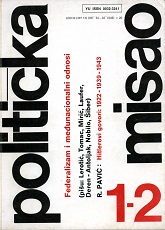Etiopija: unitarizam, separatizam, autonomija
Ethiopia: Unitarism, Separatism, Autonomy
Author(s): Mario NobiloSubject(s): Politics, Political Theory, Political Sciences
Published by: Fakultet političkih znanosti u Zagrebu
Keywords: Ethiopia; Unitarism; Separatism; Autonomy;
Summary/Abstract: The Ethiopian revolution has eliminated feudalism, but the country has continued to be troubled by its feudal, i.e. imperialist, past. The attempts to ’integrate’ different, already formed, nations have been sustained even after the overthrow of Haile Selassie, for Mariam Mengistu did not change the unitaristic course pursued by his predecessor. The unsettled national question of Ethiopia is the root of most problems on the Horn of Africa. A number of liberation and separatist movements, as well as movements for autonomy, are active in the country, but their strength, positions, ideologies, claims and popular support differ greatly. The gravest situation is in Eritrea, where the longest war in Africa is in progress for the restaration of federal status within Ethiopia or for secession. The secession of Eritrea would make Ethiopia a landlocked state and would signal the beginning of its dismemberment. Hence the understandable et for Is to suppress to counterrevolution, though without much chance of success, especially after the unification of Eritrean liberation movements. The Eritrean question is a problem of so-called 'internal decolonisation' and of the right of the Eritrean people to self-determination. It differs from all other Ethiopian national claims by being founded on international treaties. Apart from this, Ethiopia is also the scene of activity of the Liberation Front of the Oromo People, the most numerous nation in Ethiopia, the Liberation Front of the Tigre People, the Afar Liberation Movement and the Front for the Liberation of West Somalia, which enjoys the strong support of the Somali Government. Some of these movements cooperate, but this cooperation is not strong enough to lead to the downfall of the present Ethiopian Government. A pacification of the situation in Ethiopia and on the Horn of Africa in general is inconceivable without a consistent application of the principles of Ethiopian revolution also to the national question. This need not result in the country’s fragmentation; on the contrary, it might provide a basis for the achievement of the sorely needed internal unity and for more harmonious relations with other states in the region.
Journal: Politička Misao
- Issue Year: XXII/1985
- Issue No: 01+02
- Page Range: 64-74
- Page Count: 11
- Language: Croatian

